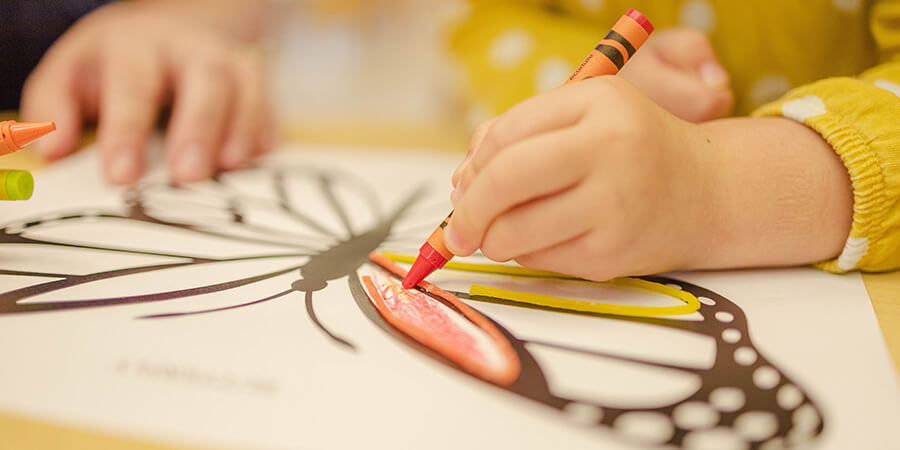13 Essential Skills of a Great
Preschool Teacher
See also: Organisational Skills for Teachers
While some early childhood educators are naturally gifted with valuable teaching skills, it is essential that all teachers, regardless of experience level, actively look for opportunities to improve their skill set.
Here are 13 vital skills you must develop to succeed as a preschool educator.

1. Creativity
Since children during their early years learn best by exploring and playing, preschool teachers must be creative to help engage their students. Young learners can better understand new information if they are motivated and intrigued. Consider innovative ways to gain your students' interest when developing your lesson plan. Provide them various tasks and utilize creative learning tools from trusted platforms such as Bright Sprouts.
2. Organizational skills
Being organized is another necessary skill of a preschool educator. With all the paperwork, essential educational documents, and school tasks, preschool teachers must develop strong organizational skills to efficiently manage everything school-related. No matter how tiny or big your workspace is, keep it as clean and clutter-free as possible so you can focus on crafting engaging lesson plans and activities for your learners. You can also use various organizational tools to help you in this endeavor.
3. Empathetic
While being empathetic has been widely known as a trait, it has recently gained traction as a vital soft skill in the workplace. Many preschoolers struggle with managing their emotions, so teachers need to be sensitive to their students' behaviors and make them feel that their feelings are validated and respected. Connecting with your learners emotionally can significantly influence their learning journey as they would associate the school as a safe space where their feelings and thoughts matter.
4. Patience
Similar to empathy, patience is a valuable soft skill that can be learned and enhanced over time. Caring for young learners can be challenging as they need genuine understanding since they're still developing at this age. Most are new to learning, and controlling their emotions can be difficult. A great preschool teacher can remain patient, especially with disruptive and indifferent students. You should also demonstrate patience with your young learners' parents or guardians when communicating or delivering unpleasant news.
5. Communication skills
Great preschool educators should be excellent communicators. Interacting positively and clearly communicating with young learners is essential as every child has different learning styles. Excellent early childhood teachers can efficiently express themselves and simplify complicated concepts. They should be good listeners and able to view challenging ideas from various perspectives. Aside from their students and respective families, preschool teachers must also be able to communicate adeptly with their colleagues and other school personnel without instigating conflict.
6. Time management
Another essential skill preschool teachers need is time management skills. Great teachers are able to effectively maximize the time given to them. They're able to juggle their workload proficiently without compromising their performance quality. To succeed in this field, you must learn to work smart and use time to your advantage.
While multitasking offers several benefits, some teachers might find it more counterproductive and stressful. Doing various tasks simultaneously requires switching mental gears, making you more susceptible to errors.
7. Enthusiasm
Being a preschool teacher can be physically draining as you are most likely on your feet all day with minimal breaks. It can also be emotionally taxing if you have to deal with challenging learners constantly. It is crucial that you have an enthusiastic attitude that complements your young students' energy levels. Children are more likely to learn in a positive environment, so being enthusiastic when teaching is necessary.
8. Collaborative skills
Preschool teachers often collaborate with other educators, so being able to work well with other professionals is essential. Most often, early childhood educators collaborating with others are more effective since they can exchange learnings, resources, and ideas. Working with your colleagues can also prevent you from making costly mistakes and allow you to form meaningful and long-lasting relationships.
9. Flexibility
Another essential skill of great preschool teachers is being able to demonstrate flexibility. Children learn at varying paces, so it is essential that educators are able to respond in a manner that suits their learners best. They can adapt to new and unexpected situations and change teaching strategies efficiently. Preschool educators must be able to improvise if needed to suit their students' learning needs and preferences.
10. Problem-solving skills
Social conflicts are common with preschoolers since they have different backgrounds and personalities. It is critical that preschool teachers can resolve disputes in a constructive and timely manner. Great teachers can efficiently detect possible quarrels and prevent them from escalating. They can also act as efficient mediators and ensure these disputes won't affect their students' learning experiences.
11. Behavior management
Preschoolers tend to exhibit challenging behaviors, especially when reprimanded or uncomfortable. They would often have tantrums and demonstrate actions that can hurt their classmates. Early childhood educators must be able to efficiently establish their authority in the classroom using a non-dictatorship approach. They should also be ready to handle their students' multiple demeanors.
12. Technical skills
Preschool educators provide the foundation for a child's learning. Great teachers should have a firm grasp of their respective subject matter expertise so they can efficiently educate their young learners. They should also have the necessary certifications and licenses. A great preschool educator is also willing to learn new information and use modern resources. While they don't need to be technology-savvy, they must be open to accommodating technical devices, especially if these innovations significantly complement their teaching methods.
13. Passionate
While being passionate is more of a character trait and not a skill, it is a valuable attribute that can help you succeed as a preschool teacher. Preschool educators must be passionate about teaching so they can efficiently drive engagement to their students. They must be willing to find new ways to educate the young minds of their learners. Children are more likely to absorb new information if they are engaged and excited.
Preschool teachers are integral to a child's development and learning journey. If you want to succeed in this dynamic field, take note of the skills, do your best to develop them, and actively look for growth opportunities.

